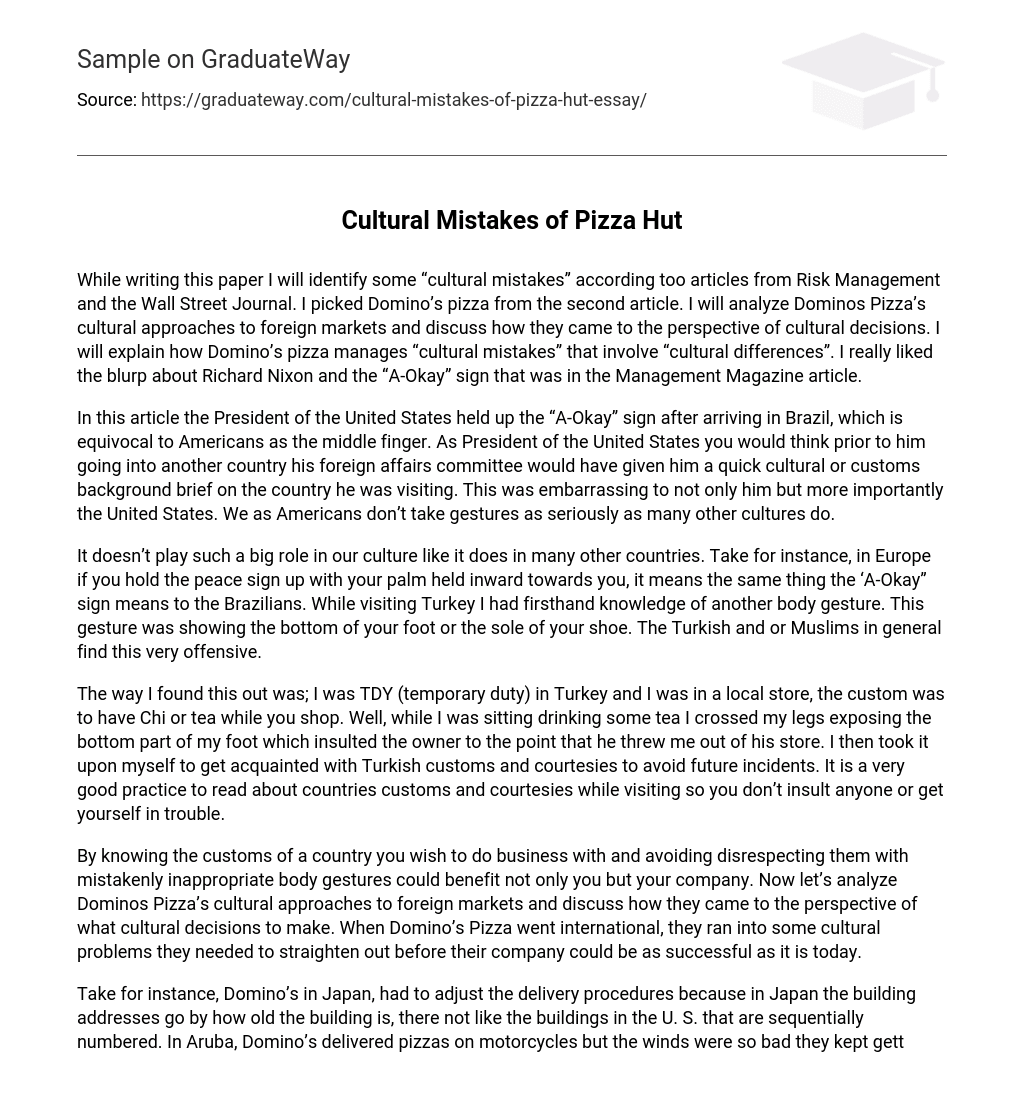In this paper, I will examine the concept of “cultural mistakes” based on articles from Risk Management and the Wall Street Journal. Specifically, I will focus on Domino’s pizza as discussed in the second article. I will assess how Domino’s Pizza approaches foreign markets and the factors that shape their cultural decisions. Additionally, I will explore how Domino’s Pizza handles cultural mistakes resulting from cultural differences. Notably, the Management Magazine article featuring Richard Nixon and the use of the “A-Okay” sign particularly caught my attention.
In this article, the President of the United States was seen making the “A-Okay” sign upon arriving in Brazil. This sign is seen as offensive by Americans, similar to showing the middle finger. It is surprising that as the President, he did not receive a cultural brief from his foreign affairs committee before visiting another country. This incident was not only embarrassing for him but also for the United States. Unlike many other cultures, Americans do not attach as much importance to gestures.
Unlike many other countries, the peace sign does not play a significant role in our culture. For instance, in Europe, if you hold the peace sign up with your palm held inward towards you, it carries the same meaning as the ‘A-Okay’ sign to Brazilians. During my visit to Turkey, I learned about another body gesture firsthand – showing the bottom of your foot or the sole of your shoe. This gesture is considered highly offensive to Turks and Muslims in general.
While I was TDY (temporary duty) in Turkey, I learned an important lesson about cultural etiquette. In a local store, it was customary to enjoy chi or tea while shopping. However, my actions caused unintentional offense. As I sat sipping tea, I unknowingly exposed the bottom of my foot, which greatly insulted the owner. Consequently, he expelled me from his store. Determined to prevent future mishaps, I made it a point to familiarize myself with Turkish customs and courtesies. Therefore, it is highly advisable to research and learn about a country’s customs and courtesies when visiting, in order to avoid any disrespectful actions or trouble.
Understanding the customs of a country you intend to do business with and being mindful of avoiding offensive body language can be advantageous for both you and your company. Let us now examine Dominos Pizza’s strategies for approaching cultural differences in foreign markets and explore how they arrived at their decision-making process. When venturing into international territories, Dominos Pizza encountered certain cultural challenges that required resolution in order for the company to achieve its current level of success.
Domino’s had to make delivery adjustments in different countries. In Japan, the building addresses are based on the age of the buildings, unlike the sequential numbering used in the U.S. In Aruba, Domino’s initially used motorcycles for deliveries but strong winds caused frequent accidents, so they switched to using small trucks. In Italy, some Italians felt that Domino’s pizzas had too much sauce and excessive toppings.
In Italy, the reception was poor and consequently Dominos had to completely withdraw from the Italian market. Going international with a company or franchise requires careful consideration. It is necessary for companies to dedicate time and effort to establish it correctly in order to be both productive and successful. The solutions implemented in Japan and Aruba were relatively simple, unlike the situation in Italy. In order to achieve success in Italy, a complete change in recipe would have been required.
If Domino’s had conducted better research into Italian preferences for pizza sauces, perhaps conducting taste tests or asking people on the streets for their opinions, they would have avoided the problems they faced in Italy. Had they conducted proper research, they would have realized that Italians found their sauce too bold and could have taken steps to adjust accordingly. Alternatively, they could have followed Pizza Hut’s example in Turkey, where they use goat cheese and chopped hot dogs as pepperoni toppings on their pizzas.
I believe that it is ultimately the decision of a company whether or not they should alter their original recipe to cater to a specific country. However, I personally think that Pizza Hut should have chosen to withdraw from Turkey. It is important for businesses to find a trustworthy insider or local who can guide them in understanding the local culture, which would facilitate a smoother transition in that country and prevent small mistakes like those made in Japan and Aruba. While companies will inevitably encounter minor obstacles, conducting thorough research can help them avoid major issues.
Heck, they might even discover that it’s not worth attending at all. Having a reliable partner from that country will assist in resolving these issues smoothly and ensuring a swift transition. I have identified certain “cultural mistakes” based on articles from Risk Management and the Wall Street Journal. I have examined Dominos Pizza’s cultural strategies in foreign markets and discussed their cultural decision-making process. Finally, I have addressed how they effectively handled their “cultural mistakes” arising from “cultural differences”.





